 Petzlover
Petzlover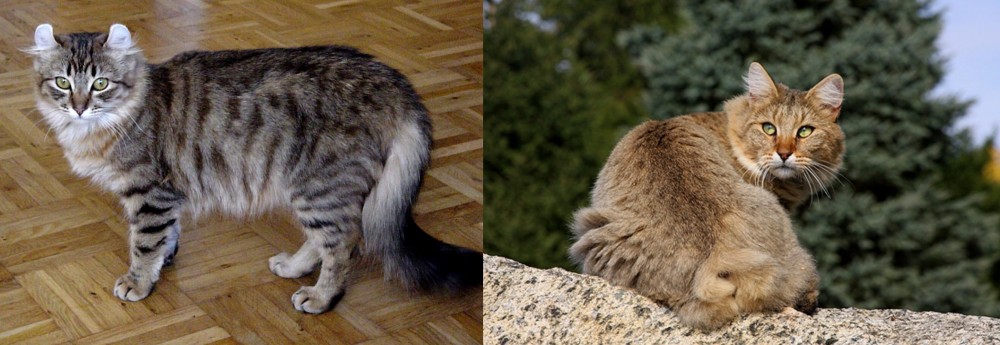 Both American Curl and Jungle-Bob are originated from United States. Both American Curl and Jungle-Bob are having almost same weight. American Curl may live 5 years more than Jungle-Bob. Both American Curl and Jungle-Bob has same litter size. Both American Curl and Jungle-Bob requires Moderate Maintenance.
Both American Curl and Jungle-Bob are originated from United States. Both American Curl and Jungle-Bob are having almost same weight. American Curl may live 5 years more than Jungle-Bob. Both American Curl and Jungle-Bob has same litter size. Both American Curl and Jungle-Bob requires Moderate Maintenance.
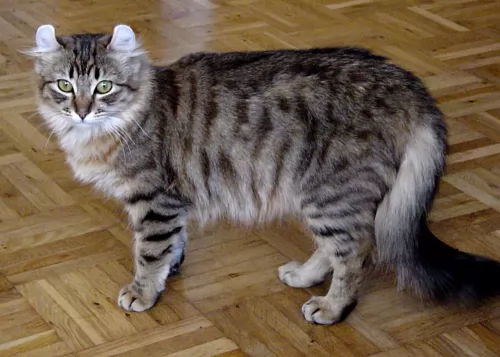 The American Curl is well known for its unusual shaped ears and for being one of the youngest cat breeds.
The American Curl is well known for its unusual shaped ears and for being one of the youngest cat breeds.
It developed in California. The first of these cats appeared to have been strays that arrived in California in 1981. The black female’s name was Shulamith, and she gave birth to a litter with the same curled ears, and was the ancestor of the American Curls of today.
Appearing in a cat show in 1992 for the first time, the longhaired American Curl was then given championship status by TICA and it was also admitted to the Cat Fanciers Association’s championship class in the long- and shorthaired divisions.
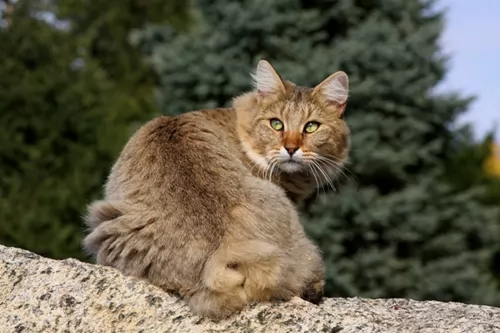 What is notable about this cat is that it can have a Bobcat like tail or it can have a full-length tail. They’re a fairly new breed and have been bred since the early 1990s. The whole purpose of breeding the cat was to develop a jungle cat hybrid with a spotted pattern.
What is notable about this cat is that it can have a Bobcat like tail or it can have a full-length tail. They’re a fairly new breed and have been bred since the early 1990s. The whole purpose of breeding the cat was to develop a jungle cat hybrid with a spotted pattern.
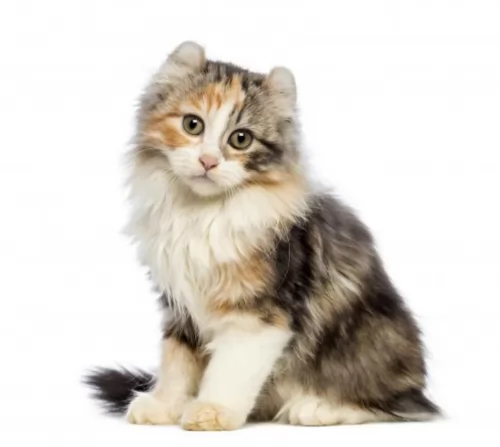 The American Curl is a medium-sized cat weighing roughly 2.3–4.5kg. Its a cat that stands between 21 and 27cm in height.
The American Curl is a medium-sized cat weighing roughly 2.3–4.5kg. Its a cat that stands between 21 and 27cm in height.
It’s also a cat that takes a fairly long time to mature, reaching maturity about 2 or 3 years of age. The most distinctive feature of this cat is its unusual ears that curl backward as opposed to standing up like most other cats. At birth the ears are straight but they gradually start curling back, staying in a tight bud position.
The American Curl's coat is soft and silky and doesn’t require too much grooming. The fur comes in colors such as grey, white, apricot, black, and the coat can be a solid color or in a host of different patterns such as bi-color, triple-color, tabby, ticking and others.
The head is round, the eyes of the cat are large, giving the cat an alert, friendly look. The eyes can be many different colors from blue to green, amber, copper, hazel, and yellow.
The American Curl Cat loves his human family and gets on well with children too. He is an adaptable cat, settling into different lifestyles. You’ve got to watch him around small children who might manhandle him and pull his sensitive ears.
Nonetheless, he is sociable and loving. He is an intelligent cat, being active and alert and will even follow you around to see what you’re doing that he can be involved in too. He isn’t a particularly talkative breed but he loves to play and can even learn to fetch a smallish ball.
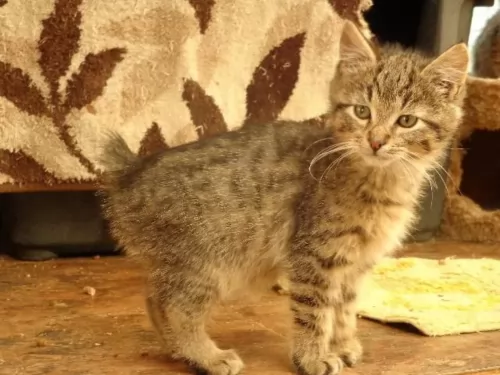 These are big cats and can weigh between 6 and 10kg. The leopard-spotted coat comes in all shades – brown, tawny, gold, silver and black with you not likely to see solid shades.
These are big cats and can weigh between 6 and 10kg. The leopard-spotted coat comes in all shades – brown, tawny, gold, silver and black with you not likely to see solid shades.
The coat can be short or medium-length. The cats have a thick muzzle and he has hooded eyes. The ears are fairly large and placed high o the head. They’re well muscled with long legs with the hind legs being fairly longer than the front legs
The Jungle-Bob loves his food. He loves interactive toys that hold the food and encourage him to think about how to get the food out.
He loves his human family and bonds strongly with them, loving to play rough and tumble games with the kids. He gets on well with children as well as other pets in the house.
You may find your Jungle-Bob being shy and not wanting to be friendly with strangers. They’re intelligent cats and have been known to learn how to open certain doors and cupboards. They can also be taught to walk on a leash.
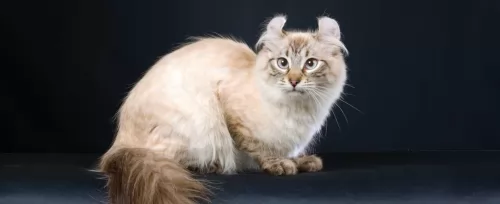 You’ll find your American Curl to be a friendly, loving cat that will easily bond with his human family. They’re adaptable cats and will happily adjust to your lifestyle.
You’ll find your American Curl to be a friendly, loving cat that will easily bond with his human family. They’re adaptable cats and will happily adjust to your lifestyle.
Despite their affection, however, American Curls aren't the type of cats to want to be pampered and petted - they are quite happy just to sit next to their owner and relax, or play with their toys.
Because American Curls are highly adaptable, they're suitable for a number of different home types, and homes with other pets or children, making you a splendid feline pet and companion.
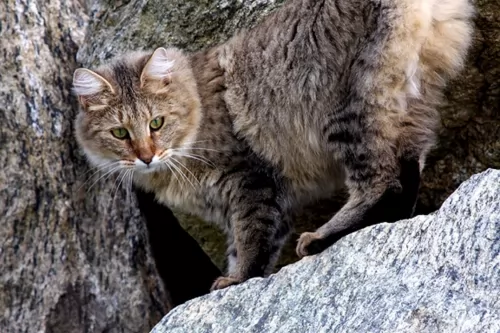 Your Jungle-Bob, just like all cats with a wild side, should have a largish outdoor cage. Keeping a hybrid cat like the Jungle-Bob is far more challenging than keeping a regular domesticated cat.
Your Jungle-Bob, just like all cats with a wild side, should have a largish outdoor cage. Keeping a hybrid cat like the Jungle-Bob is far more challenging than keeping a regular domesticated cat.
Hybrid cats like these are always active and they require lots of exercise. They can learn to walk on a leash.
Hybrid cats like this are made up of many species and they come with lots of interesting fur patterns. but that shouldn't be your motivation for buying one.
Think carefully before you own one of these cats as they’re beautiful for sure, but sometimes they become too much for the owners and then they land up in shelters. Be informed before you invest in one of these cats.
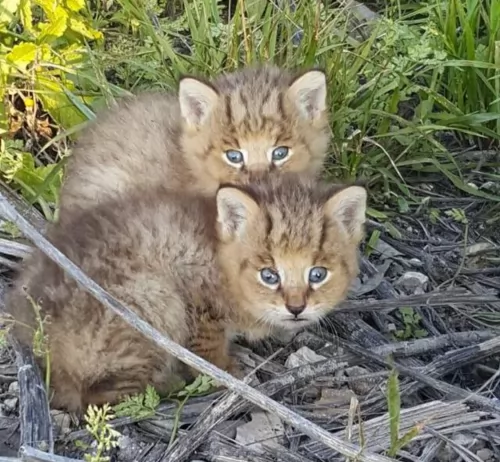 Even a trip to the vet can be a challenge and it can be a frightening experience for a hybrid cat. They may even need to be sedated before the vet can examine them.
Even a trip to the vet can be a challenge and it can be a frightening experience for a hybrid cat. They may even need to be sedated before the vet can examine them.
Also, did you know that in terms of rabies, which can be a fatal disease, it is not positive that these vaccines even work with a hybrid cat? So if your pet is exposed to rabies, it could spell great danger for you and your hybrid pet.
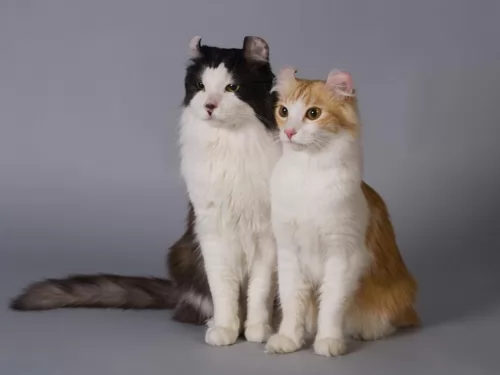 The Curl’s coat can be either short or long, but with a gentle brushing, the coat can be well maintained. The shorthaired variety sheds a bit more during the year than the longhaired variety and this is why grooming and brushing becomes necessary.
The Curl’s coat can be either short or long, but with a gentle brushing, the coat can be well maintained. The shorthaired variety sheds a bit more during the year than the longhaired variety and this is why grooming and brushing becomes necessary.
You can brush your cat’s teeth to avoid periodontal disease.
Trim your cat’s nails every other week if they don’t wear down naturally.
Check inside- and outside the cat’s ears for parasites and dirt. The cat’s ears have a unique shape and they may well be born with narrowed ear canals that can trap dirt and wax and this results in ear infections.
Like all cats breeds, your lean, muscular American Curl can be susceptible to obesity and heart disease. Speak to your vet about a special cat food for your feline friend as cat food is specially formulated to deliver the exact level of natural vitamins, minerals, fiber and antioxidants needed. Understand the amount of food your Curl requires by checking out the feeding instructions on the food labels. Always talk to your vet if you're not sure how much and what you should feed your cat.
Remember, that if you don’t want to do these grooming routines for your cat for fear of hurting him or not doing it properly, the vet or your local pet groomer will do it for you.
Make sure to provide your intelligent American Curl with toys and exercise. You can buy toys and games that will challenge his mental and physical abilities.
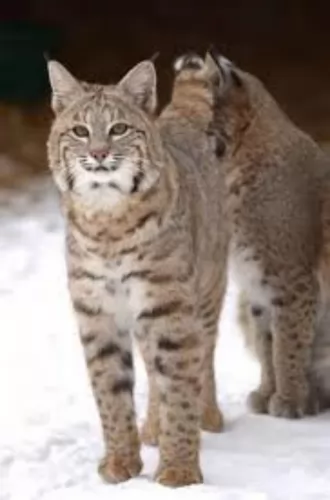 Before you invest in one of these hybrid exotic cats do research because they’re different from your regular domestic cats.
Before you invest in one of these hybrid exotic cats do research because they’re different from your regular domestic cats.
Because they have a wild side, they’re not suited to small apartments. Apart from being both an indoor and outdoor cat, he will require a fairly large outdoor cage with one part dedicated to shade and shelter for him.
Even though you will buy your Jungle Bob a litter box for indoors, remember that even though you train your cat to use it, the wild part of the cat means that he will spray and do his business on your carpets or against your furniture as well.
This is precisely why so many cat shelters are full of these cats. They become a handful for their owners, and their owners just hand them in as a bad experience.
A hybrid cat like the Jungle-Bob has a digestive system not quite the same as your regular domestic cat. It is absolutely imperative that these cats receive a meat diet as they are carnivores.
Keeping such a cat as a pet means you will need to invest in high-quality protein foods that sit well with this cat’s digestive system. A good guide for the Jungle Bob-cat is to steer clear of carbohydrates and feed your cat a protein-rich diet.
It is also a wise move to feed your new kitten the food that he has been eating at the breeder and then to make a gradual change to the best food protein there is.
Speak to your vet if in any kind of doubt. There are excellent high protein, high-quality commercial cat foods available on the market that make feeding a cat convenient as well.